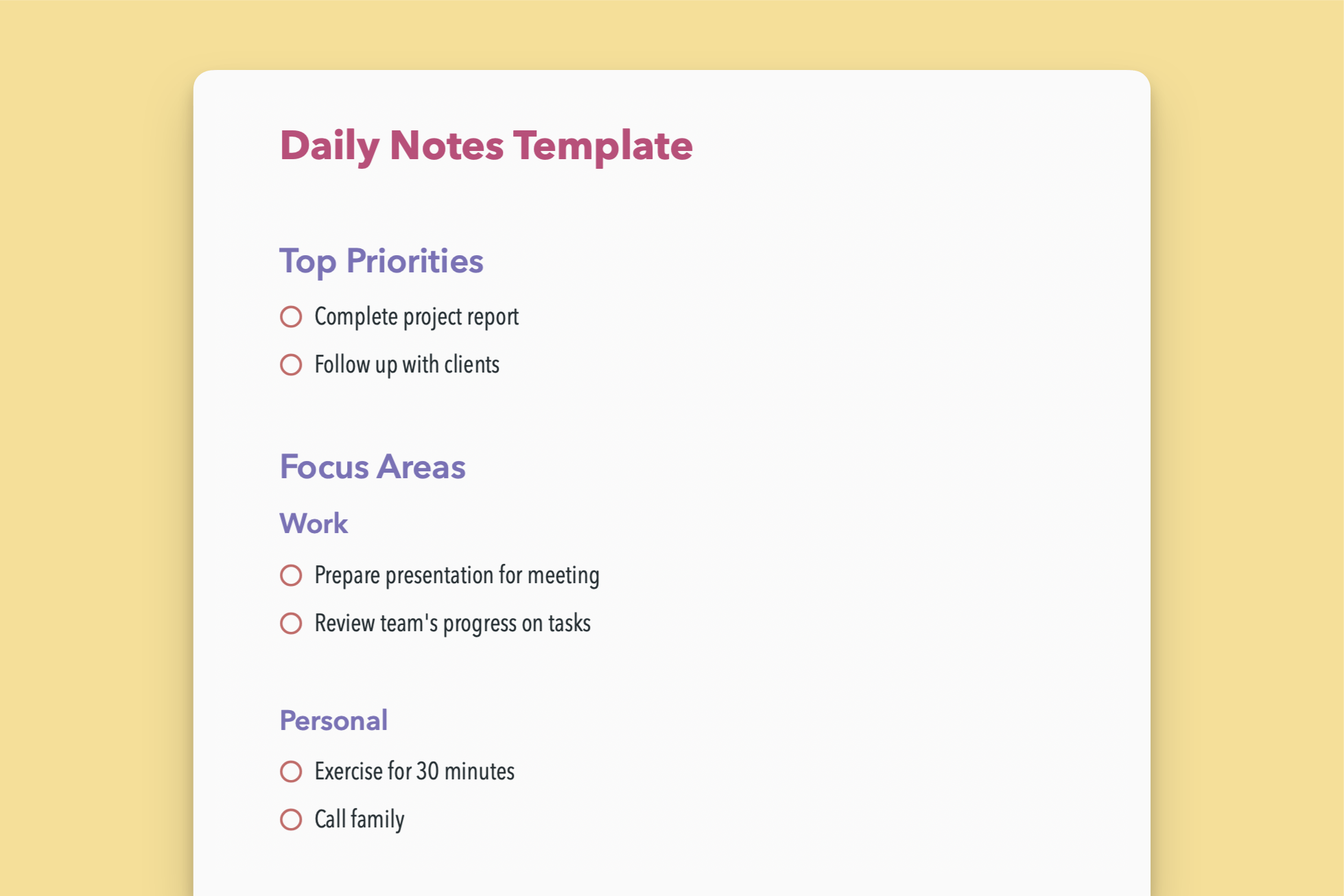Home

Daily Notes Template
Boost productivity and focus with this customizable daily notes template for work, personal tasks, and self-reflection.

Meet
Get things done with NotePlan
Categories
This comprehensive daily notes template is designed to empower you to take charge of your day, streamline tasks, enhance focus, and foster self-reflection. By incorporating this template into your daily routine, you'll gain clarity, boost productivity, and create space for personal growth and gratitude.
Key features and benefits
- Top Priorities: Highlight your most important tasks for the day, ensuring they get your undivided attention and are completed efficiently.
- Focus Areas (Work/Personal): Divide your daily tasks into work-related and personal categories, maintaining a clear distinction between your professional and private spheres.
- Meetings & Events: Log essential details about upcoming meetings and events, including time, attendees, and agenda items, to stay prepared and organized.
- Notes & Ideas: A dedicated space for capturing fleeting thoughts, brilliant ideas, meeting notes, or any other information relevant to your day. Utilize hashtags for easy categorization and future reference.
- Grateful For: Cultivate a daily gratitude practice by reflecting on things you're thankful for, enhancing your overall well-being and fostering a positive outlook.
- End of Day Reflection: Review your wins, acknowledge any challenges, and set your focus for the next day. This practice promotes self-awareness, growth, and continuous improvement.
How to use?
- Start your day by reviewing your top priorities and focus areas.
- As you complete tasks, check them off your list for a sense of accomplishment and progress.
- Add notes, ideas, and meeting details as they arise throughout the day.
- At the end of the day, reflect on your accomplishments, challenges, and gratitude.
- Plan for tomorrow by setting your focus for the next day.
Customization
Feel free to adapt and customize this template to suit your unique needs and preferences. You can add additional sections, adjust categories, or incorporate other elements that enhance your productivity and self-reflection.
The importance of Daily Reflection
Taking a few minutes each day to reflect on your experiences, accomplishments, and gratitude can have a profound impact on your personal and professional life. It helps you stay grounded, focused, and motivated, while also providing valuable insights for personal growth and development.
Daily Notes serve as a versatile tool for personal knowledge management, organization, and productivity. Here's why you should consider using them:
- Daily Notes act as a central hub to jot down thoughts, ideas, tasks, events, and anything else that comes up throughout the day. This prevents information from getting lost and makes it easier to review and reflect on later.
- By logging daily activities, goals, and achievements, you can track your progress over time and identify patterns or areas for improvement.
- Daily Notes can be used for journaling, allowing you to record your experiences, thoughts, and feelings. This can help you gain self-awareness, reduce stress, and improve your mental well-being.
- Daily Notes can serve as a space for planning your day, week, or future goals. They can also be used to reflect on your day, identify what worked well, and what could be improved.
- The act of writing down tasks and ideas can help to declutter your mind and improve your focus on what's important.
- Over time, Daily Notes build up a valuable archive of your life and work, providing a rich source of information and insights.
- Choose your tool: If you prefer a digital note-taking app with features specifically designed for daily planning and task management, consider NotePlan. NotePlan offers functionalities like creating daily, weekly, and monthly notes, scheduling tasks with time blocking, and setting reminders. Additionally, it allows you to link notes together and categorize them with tags, facilitating organization and information retrieval.
- Set a Specific Time: Allocate a specific time each day to create and review your daily notes. This could be first thing in the morning to plan your day, during a lunch break to reflect on your progress, or at the end of the day to summarize your achievements and set goals for the next day.
- Start Simple: Begin with a basic structure for your daily notes, such as a list of tasks, a schedule, or a section for capturing ideas. You can gradually add more sections or details as you get used to the practice.
- Incorporate Prompts: If you find yourself struggling to fill your daily notes, use prompts to guide your thinking. Some examples include:
- What are my top 3 priorities for today? What did I accomplish yesterday? What challenges did I face today and how can I overcome them? What am I grateful for today?
- Link to Other Notes: If you use NotePlan, take advantage of its linking functionality to connect your daily notes to other relevant notes or projects. This can help you create a web of interconnected ideas and easily find information later on.
- Review and Reflect: Regularly review your daily notes to track your progress, identify patterns, and gain insights into your work habits. This can help you refine your workflow, optimize your time management, and achieve your goals more effectively.
- Be Consistent: The key to successfully integrating daily notes into your routine is consistency. Make it a habit to create and review your notes each day, even if you only have a few minutes to spare.
- The biggest challenge is often maintaining the habit of writing daily notes. Life gets busy, and it's easy to forget or skip a day. This can lead to discouragement and eventually abandoning the practice altogether.
- Allocating time for daily notes can be difficult, especially when juggling multiple responsibilities. It's important to find a time that works best for you, whether it's first thing in the morning, during a break, or before bed.
- Some people feel overwhelmed by the idea of writing daily notes, especially if they don't know where to start or what to write about. It's helpful to start simple and gradually add more details as you get comfortable with the practice.
- Striving for perfect notes can lead to procrastination and anxiety. Remember that daily notes are for you, not for others. They don't need to be perfectly formatted or grammatically correct.
- Without a clear purpose or structure, daily notes can feel aimless. It's helpful to set goals for your notes, such as tracking progress on a project, brainstorming ideas, or reflecting on your day.
- Some people are resistant to change and may find it difficult to incorporate a new habit into their routine. It's important to be patient with yourself and allow time for the practice to become a natural part of your day.